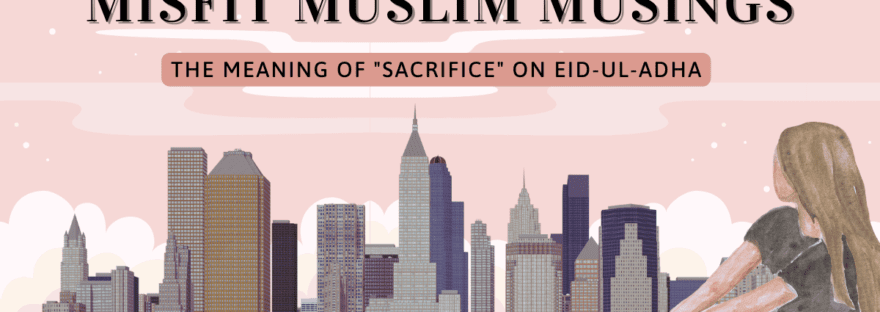This year, being far away from home means that when it comes to celebrating religious events like Eid-Ul-Adha, I would be spending the whole day with my beautiful, wonderful friends–most of whom are non-Muslims–instead of with people from my community. Of course, it also meant that I had to explain to them the meaning of sacrifice on Eid-Ul-Adha.
To those unaware, Eid-Ul-Fitr and Eid-Ul-Adha are the only two important religious events that Muslims get to celebrate, and both events are rooted in historical symbolism.

~ The Meaning of Sacrifice On Eid-Ul-Adha ~
Eid-Ul-Fitr is a celebration observed after 30 days of fasting during Ramadan–a time during which we not only refuse food and water from sunrise till sunset, but also practice self-restraint in every aspect of our lives (not losing our temper, speaking kind words, not thinking bad thoughts, controlling irritation and annoyance, etc).
And while Eid-Ul-Fitr does inspire some feelings of awe and amazement from many non-Muslims folks….Eid-Ul-Adha often inspires raised eyebrows and barely controlled horror. All because on Eid-Ul-Adha, Muslims sacrifice an animal in the name of Allah.
Now I can understand the shock and horror surrounding the concept of animal sacrifice when it comes from vegetarians or vegans, and I suppose I can understand the same reaction from non-vegetarians to a certain degree.
After all, the process of sacrificing the animal involves one quick swipe across the jaguar vein with a super sharp blade. It sounds horrific, gruesome…and as someone who has witnessed it in person several times, it is excruciating to watch.
What many fail to realize is that is the point. The meaning of sacrifice on Eid-Ul-Adha is both symbolic and humbling, because it serves as a reminder that an innocent life was taken to sustain our own, and we should therefore treat every living being and each of Allah’s creations with the utmost respect and compassion. For all things on this earth and in the universe belongs to Allah, and to Allah alone we will all return.
Those of us who are non-vegetarians, we often forget that the food we eat came from an innocent creature created by God. A creature that had a life, that felt pain and happiness and suffering and joy. We do not think about the pain the animal might have felt from being killed by a stun gun when we order a chicken burger or bite into a delicious steak.
But Islam requires us Muslims to always be hyper conscious of every blessing we have been given by Allah, including the sustenance that He has bestowed on us. And since all of these blessings came from Allah alone, we must be willing to give up those very blessings in Allah’s name whenever we are commanded to do so, for everything on heaven and earth belongs to Him only.
This willingness to sacrifice what is precious to us in Allah’s name is rooted in the story of Abraham, and how he was ready to sacrifice his own son Ismail when Allah commanded him to give up whatever was most dearest to him. Of course, he did not actually sacrifice his son–Allah sent angels to prevent that from happening and as a reward for both of their obedience and submission to Allah, they were given a sheep to sacrifice instead.
Growing up, this story always left me with a sense of awe and wonder. But having witnessed so many sacrifices over the years, and being hyper aware of where my food comes from thanks to this practice, I cannot help but question myself: would I be able to sacrifice an animal–let alone anything or anyone dear to me–in the name of God?
I do not know.
What I do know is that I will not accept the demonizing of this practice by people who have no qualms buying and consuming meat from unsustainable farming practices. Neither will I accept the demonizing of this practice by people who believe a shocking death from a stun gun is better than a quick death from a sharp blade.
I will especially not accept the demonizing of this practice when it serves a greater cause to the community as well–the meaning of sacrifice on Eid-Ul-Adha also includes practicing community service, because the meat from the animal slaughtered is distributed equally to the poor and needy, to your neighbors and to your family members.
And I have seen too many happy smiles on impoverished, malnourished faces on the day of Eid-Ul-Adha whenever meat is distributed after slaughter to allow anyone to call it an act of selfishness and barbarism.
This post is part of my series, Misfit Muslim Musings. While I understand that discussions around faith can be sensitive and controversial, I also request that you remember that people are not monoliths, and engage in respectful discourse in this space.
If you liked this post, consider my previous post in this series: My Problems With Organized Religion.

I had never heard of this celebration before, thank you for sharing with us!
When you think about it, it isn’t too different from what farm owners do- raising chicken to eat them 🤷🏽♀️ I love the sense of community of sharing with others 💕